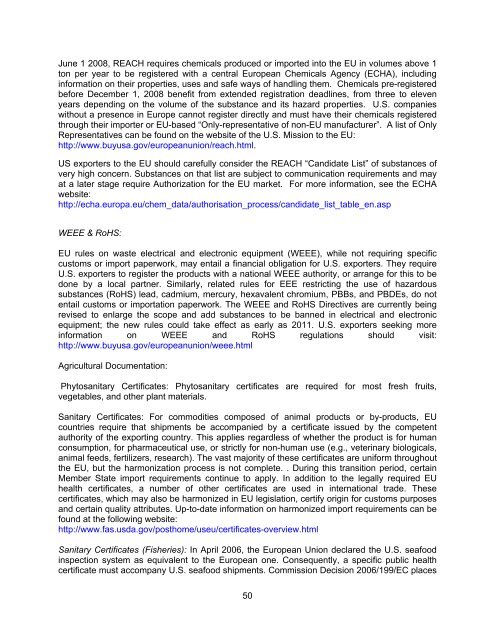Doing Business in Hungary 2010 - International Franchise Association
Doing Business in Hungary 2010 - International Franchise Association
Doing Business in Hungary 2010 - International Franchise Association
Create successful ePaper yourself
Turn your PDF publications into a flip-book with our unique Google optimized e-Paper software.
June 1 2008, REACH requires chemicals produced or imported <strong>in</strong>to the EU <strong>in</strong> volumes above 1<br />
ton per year to be registered with a central European Chemicals Agency (ECHA), <strong>in</strong>clud<strong>in</strong>g<br />
<strong>in</strong>formation on their properties, uses and safe ways of handl<strong>in</strong>g them. Chemicals pre-registered<br />
before December 1, 2008 benefit from extended registration deadl<strong>in</strong>es, from three to eleven<br />
years depend<strong>in</strong>g on the volume of the substance and its hazard properties. U.S. companies<br />
without a presence <strong>in</strong> Europe cannot register directly and must have their chemicals registered<br />
through their importer or EU-based “Only-representative of non-EU manufacturer”. A list of Only<br />
Representatives can be found on the website of the U.S. Mission to the EU:<br />
http://www.buyusa.gov/europeanunion/reach.html.<br />
US exporters to the EU should carefully consider the REACH “Candidate List” of substances of<br />
very high concern. Substances on that list are subject to communication requirements and may<br />
at a later stage require Authorization for the EU market. For more <strong>in</strong>formation, see the ECHA<br />
website:<br />
http://echa.europa.eu/chem_data/authorisation_process/candidate_list_table_en.asp<br />
WEEE & RoHS:<br />
EU rules on waste electrical and electronic equipment (WEEE), while not requir<strong>in</strong>g specific<br />
customs or import paperwork, may entail a f<strong>in</strong>ancial obligation for U.S. exporters. They require<br />
U.S. exporters to register the products with a national WEEE authority, or arrange for this to be<br />
done by a local partner. Similarly, related rules for EEE restrict<strong>in</strong>g the use of hazardous<br />
substances (RoHS) lead, cadmium, mercury, hexavalent chromium, PBBs, and PBDEs, do not<br />
entail customs or importation paperwork. The WEEE and RoHS Directives are currently be<strong>in</strong>g<br />
revised to enlarge the scope and add substances to be banned <strong>in</strong> electrical and electronic<br />
equipment; the new rules could take effect as early as 2011. U.S. exporters seek<strong>in</strong>g more<br />
<strong>in</strong>formation on WEEE and RoHS regulations should visit:<br />
http://www.buyusa.gov/europeanunion/weee.html<br />
Agricultural Documentation:<br />
Phytosanitary Certificates: Phytosanitary certificates are required for most fresh fruits,<br />
vegetables, and other plant materials.<br />
Sanitary Certificates: For commodities composed of animal products or by-products, EU<br />
countries require that shipments be accompanied by a certificate issued by the competent<br />
authority of the export<strong>in</strong>g country. This applies regardless of whether the product is for human<br />
consumption, for pharmaceutical use, or strictly for non-human use (e.g., veter<strong>in</strong>ary biologicals,<br />
animal feeds, fertilizers, research). The vast majority of these certificates are uniform throughout<br />
the EU, but the harmonization process is not complete. . Dur<strong>in</strong>g this transition period, certa<strong>in</strong><br />
Member State import requirements cont<strong>in</strong>ue to apply. In addition to the legally required EU<br />
health certificates, a number of other certificates are used <strong>in</strong> <strong>in</strong>ternational trade. These<br />
certificates, which may also be harmonized <strong>in</strong> EU legislation, certify orig<strong>in</strong> for customs purposes<br />
and certa<strong>in</strong> quality attributes. Up-to-date <strong>in</strong>formation on harmonized import requirements can be<br />
found at the follow<strong>in</strong>g website:<br />
http://www.fas.usda.gov/posthome/useu/certificates-overview.html<br />
Sanitary Certificates (Fisheries): In April 2006, the European Union declared the U.S. seafood<br />
<strong>in</strong>spection system as equivalent to the European one. Consequently, a specific public health<br />
certificate must accompany U.S. seafood shipments. Commission Decision 2006/199/EC places<br />
50
















